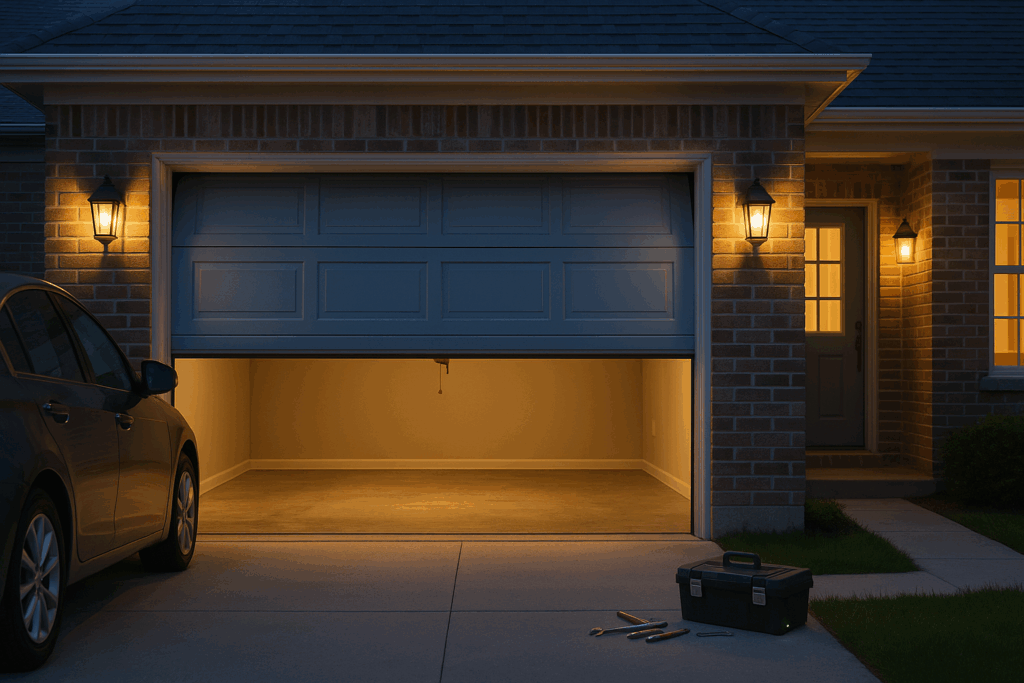Key Takeaways
1. A garage door that opens by itself is usually a sign of an electrical, mechanical, or signal-related issue, such as faulty remotes, damaged wiring, sensor problems, or control board faults.
2. Make sure to regularly inspect for obstructions, test remotes, clean sensors, and reset the opener.
3. Anchor Doors & Service offers expert diagnosis, modern garage door opener upgrades, and preventative maintenance plans to fix the problem quickly.
6 Things To Do When Your Garage Door Opens By Itself
A garage door that opens by itself is a sign that something in the system needs attention.
Before you start troubleshooting, check the safety sensors at the base of the door. Make sure nothing blocks them and that they are aligned. If they look fine, inspect the opener. Check the wall control and remote for stuck buttons, worn wiring, or visible damage.
Here are some things to do when your garage door opens by itself:
1. Scan for Obstructions First
Start with the simplest step, look around your door tracks and near the safety sensors for anything that shouldn’t be there.
Even a small twig, leaf, or piece of packaging can mess with the sensors or block the door’s path. Clearing away anything in the way can instantly get things running smoothly again.
2. Test Your Remote and Keypad
Remotes and keypads are often the quiet troublemakers. Weak batteries or buttons that stick can send mixed signals to your opener or trigger it when you don’t mean to. Pop in fresh batteries and test each button.
If your remote usually lives in a cluttered bag or glove compartment, give it a safer home so it doesn’t get pressed accidentally.
3. Clean and Align the Safety Sensors
Those little sensors at the bottom of your garage door tracks are sensitive, and that’s a good thing. But dust, cobwebs, or a slight bump can throw them off.
Wipe the lenses gently with a soft cloth, then check that they’re lined up perfectly at the same height and facing each other. A tiny adjustment can make a big difference.
4. Reset Your Opener With a Quick Power Cycle
Electronics sometimes need a restart. Unplug your opener for about 30 seconds, then plug it back in. This reset can solve minor glitches that could cause your door to open unexpectedly or malfunction.
5. Confirm the Power Supply
Make sure the opener’s plug is fully seated in the wall outlet, and check that the electrical circuit breaker hasn’t tripped. Power outage or loose connections often result in unpredictable door activity.
6. Listen for Clues
Open and close the door while paying attention to the sounds it makes. If the motor hums quietly and moves smoothly, the issue is likely electrical or remote-related. Hear grinding, creaking, or scraping? That might point to mechanical wear or misalignment.
Looking for a trusted service provider? Anchor Doors specializes in residential garage door openers, offering expert parts, service, and installation, especially for top brands like LiftMaster, Genie, and Craftsman.
Our knowledgeable team keeps service trucks stocked with common replacement parts and can schedule appointments at a time that fits your day. Our firsthand experience across brands ensures diagnostics and repairs are done effectively.
Common Reasons Why Your Garage Door Opens By Itself
A garage door opening by itself can point to issues with the remote, wiring, sensors, or even the opener’s internal electronics. Here are some common reasons why:
1. Stuck or Damaged Remote Control
Your garage door remote works by sending a wireless signal to the opener, but if the button gets stuck, is cracked, or is overly sensitive, it can send the signal nonstop.
Solution:
- Inspect for cracks, worn buttons, or any other irregularities that appear out of place.
- Weak batteries can cause odd behavior, so swap them out to see if that solves the issue.
- Keep the remote in a place where it can’t be squished, bumped, or pressed by accident, such as in a small compartment or hook.
- If the remote is clearly damaged or still malfunctioning after basic checks, consider purchasing a new, compatible one to avoid further issues.
2. Damaged or Frayed Wiring
The wiring inside your garage door system acts like its nervous system, sending random signals between the wall button, keypad, motor unit, and safety sensors. If any of these wires are frayed, worn, or have exposed metal, they can “misfire” and send random commands to your opener.
Solution:
- Check damaged wires or small-gauge wires leading to the opener, wall controls, and sensors for cracks, cuts, or rusted ends.
- Make sure all plugs and screw terminals are snug and properly covered.
- If you find damage, call Anchor Doors & Service to fix it.
3. Misaligned or Faulty Safety Sensors
Those small boxes mounted near the bottom of your door tracks are safety sensors. They “talk” to each other using an invisible beam to make sure nothing’s blocking the door.
Solution:
- Both sensors should sit at the same height, directly facing each other.
- Use a soft cloth to remove dust, cobwebs, or smudges.
- Make sure there are no cuts or loose connections. If cleaning and aligning don’t resolve the issue, the sensors may need to be replaced to open garage door.
4. Radio Interference or Accidental Remote Programming
When you reprogram your remote or keypad, your opener system temporarily “listens” for any signal nearby. If homeowners happen to press their remote at that exact moment, your opener might pair with it, allowing their remote to operate your garage door without either of you realizing it.
Solution:
- On most models, hold the “Learn” button until the indicator beam of light turns off. This erases every paired remote, keypad, and device.
- Pair only the remotes and keypads you own, following your manufacturer’s instructions.
- Avoid programming your garage door when other garage doors nearby are in use.
5. Smart Device Cross-Connection
Smart garage door systems can connect to phones, tablets, or other devices for remote control. If you have ever replaced a phone, shared access with someone, or sold a house without clearing the system, an old device may still have control over your door.
Solution:
- Clear all connected devices from your opener’s memory.
- Add only the devices you actively use.
- Update your app passwords to prevent old accounts from reconnecting.
6. Control Board Malfunction
Inside your new opener is a control board, the “brain” that processes every signal. If this board fails or short-circuits, it might misread inputs and randomly tell the motor to open or close the door. This can occur after a power surge, due to wear over time, or as a result of internal component failure.
Solution:
- Unplug the opener and see if the random openings stop while it’s disconnected.
- If the garage door problems only happen when the opener is plugged in, the control board is likely the culprit.
- Control board replacement involves handling delicate electronic components and should be performed by a qualified technician.
What Are the Signs My Garage Door Opener Needs Replacing?
Common signs include loud or unusual noises during operation, slower opening and closing, frequent breakdowns, or the inability to connect with modern smart features.
- Excessive noise. Grinding, screeching, or rattling often indicates worn-out gears, loose chains, or a failing motor. Newer openers are designed to operate much more quietly.
- Slower operation. If the door hesitates, moves unevenly, or takes longer than usual to open and close, it’s a sign the opener is struggling to handle the load.
- Frequent breakdowns. Requiring constant repairs for sensor, wiring, or motor garage door issues can ultimately cost more than replacing the unit altogether.
- Inconsistent performance. The door stops midway, reverses without cause, or doesn’t respond consistently to the remote or wall switch.
- Outdated safety features. Openers built before 1993 may not have modern safety hazards features, such as photo-eye garage door sensors or auto-reverse, which are now required for safe operation.
Signs the Problem Is Electrical vs. Mechanical
When your garage door starts opening by itself, figuring out whether the root cause is electrical or mechanical can save you time, money, and unnecessary repairs. Electrical problems usually involve the opener’s circuitry, wiring, or control devices, while mechanical issues are tied to the moving parts that physically operate the door.
Here’s a table comparison:
| Signs | Electrical Issue | Mechanical Issue |
| Door behavior | Opens/closes erratically without motor strain | Moves unevenly, stops mid-cycle, or feels stuck |
| Control response | Wall button, keypad, or remote responds inconsistently | The opener motor runs, but the door doesn’t move or moves slowly |
| Visual indicators | Flickering opener lights, flashing safety sensor lights | Visible wear, rust, or misalignment in springs, tracks, or rollers |
| Sounds | No unusual mechanical noise, but the opener button may click or hum | Grinding, squeaking, or popping during movement |
| Testing | The problem disappears when the garage door opener remote or system is unplugged | The problem persists even when operating the door manually from the owner’s manual |
| Other clues | Burning smell or damaged wiring issues | Loose hardware or parts under visible strain |
Get Reliable Garage Door Solutions With Anchor Doors & Service
Garage door noise is often your door’s way of telling you something’s wrong. Whether it’s grinding from worn rollers, rattling from loose hardware, or squealing from dry hinges, ignoring these sounds can lead to more significant, costly repairs. Tackling the problem early keeps your door running smoothly and extends its lifespan.
That’s where Anchor Doors & Service comes in:
- Expert Diagnosis and Repair. Our trained garage door technicians quickly pinpoint the cause of the noise, from mechanical wear to remote opener and wall control button issues, and fix it using the right parts and techniques for lasting results.
- Upgrades to Quiet, Modern Openers. If your opener remote is outdated or beyond repair, they offer top-of-the-line LiftMaster models with belt drives, battery backup, and smart controls for whisper-quiet operation.
- Preventative Maintenance Plans. Regular inspections, lubrication, and garage door maintenance ensure your door remains safe and reliable throughout the year.
If your garage door has started speaking in squeaks, rattles, or groans, it’s time to service call the experts. Contact Anchor Doors today, Tecumseh (519) 979-9299, Chatham (519) 352-9699, or toll-free 1-888-487-4446 for a free estimate and same-day service.
FAQs
Most garage doors should be serviced by a garage door professional at least once a year. This includes inspecting the springs, cables, rollers, and garage opener for wear and tear, lubricating moving parts, and making necessary adjustments to ensure the door operates smoothly without home security risk.
Common signs include loud or unusual noises during operation, slower opening and closing, frequent breakdowns, or the inability to connect with modern smart features. If repairs are becoming frequent, upgrading to a newer, more efficient newer model may be the better investment.
It’s not recommended. Garage door springs from the side of the door are under high tension and can cause serious injury if handled improperly. A trained technician has the power tools and years of experience to replace springs safely and correctly.
Grinding, rattling, or worn rollers, loose hardware, lack of lubrication, or common issues can cause squealing noises. Addressing the problem early can prevent costly repairs; often, a simple tune-up or lubrication can make a big difference. So choose a good garage door company.

















